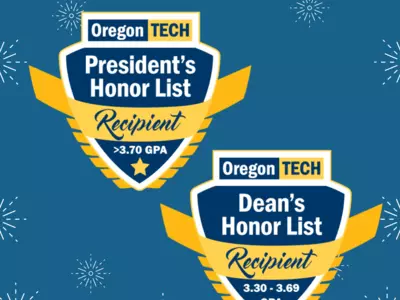
At Oregon Tech’s Portland-Metro campus, a traveled teacher and researcher in the field of power systems, power electronics, and renewable energy resources quietly and purposefully guides students in electrical engineering and renewable energy engineering, working toward those “wow” moments when students connect with the advanced concepts she teaches.
After teaching all levels of electrical engineering courses from freshmen to doctorate students on three continents, Chitra Venugopal, Ph.D., landed in the United States at Oregon Tech’s Department of Electrical Engineering and Renewable Energy (EERE) in 2018 and is now an Associate Professor and Program Director of the undergraduate program in Renewable Energy Engineering.
But before she traveled the world, Venugopal’s love of science began at a young age in a rural city in India.
“My interest in learning electrical engineering was inspired by my dad, who used to explain basic science simply by using our toys, such as a candle-powered lightweight boat and focusing sunlight through glass to warm up water and save energy,” she said.
This interest was later encouraged by teachers who motivated her to pursue engineering and advanced technology. Venugopal now claims the spot as the first engineer in her family.
As an engineer, Venugopal combines science and engineering in power systems and power electronics fields.
“I have a passion for sharing knowledge and enjoy bridging theoretical concepts with real-world applications. As an electrical engineer, I bring practical industry experience into the classroom, enriching students' learning experiences and preparing them for their future careers,” she said.
This passion for teaching has taken her to diverse student and faculty communities in India, Malaysia, Ethiopia, South Africa, and Trinidad and Tobago.
“During the years I spent in these countries as an academician, I learned to connect with diverse people, understand their cultures, backgrounds, and societal and economic constraints,” Venugopal said. “This multicultural experience in six countries across three continents helped me understand the importance of equity and inclusion in all walks of life.”

After years of focusing on electrical engineering in those countries, Venugopal wanted to combine more of her experience with renewable energy resource studies. She found Oregon Tech through a search for universities with renewable energy engineering degrees and left the University of Trinidad and Tobago in South America to join Oregon Tech’s Portland-Metro campus in Wilsonville.
“While browsing the EERE department website and the courses offered, I felt that I could be the best fit to serve in the field of renewable energy,” she said. "Teaching provides personal fulfillment and satisfaction as I feel I am making a meaningful difference in the lives of my students, helping them achieve their academic and professional goals.”
Venugopal also has diverse experience in research: she has published 44 research papers in international journals and conferences and believes that research projects prepare students for future academic and professional endeavors.
“It is exciting to see students make discoveries and contribute new knowledge to the research field,” she said. “Often, our discussions spark many project ideas, and there are excited ‘Wow’ moments when I hear students making connections to the concepts.”
At Oregon Tech, Venugopal also plays a pivotal role in curriculum development and is active in student advising and recruitment. Her knowledge of EERE program requirements makes her mentorship of students invaluable.

For six years, Oregon Tech students and the university have benefited from Venugopal’s commitment to the fields of electrical engineering and renewable energy engineering, and her dedication to student success.
“I enjoy making meaningful connections with my students,” she said. “I feel that I can get to know them individually, understanding their unique strengths and challenges, and witnessing their growth and development as they pursue their own questions and hypotheses to achieve expected results.”
###









